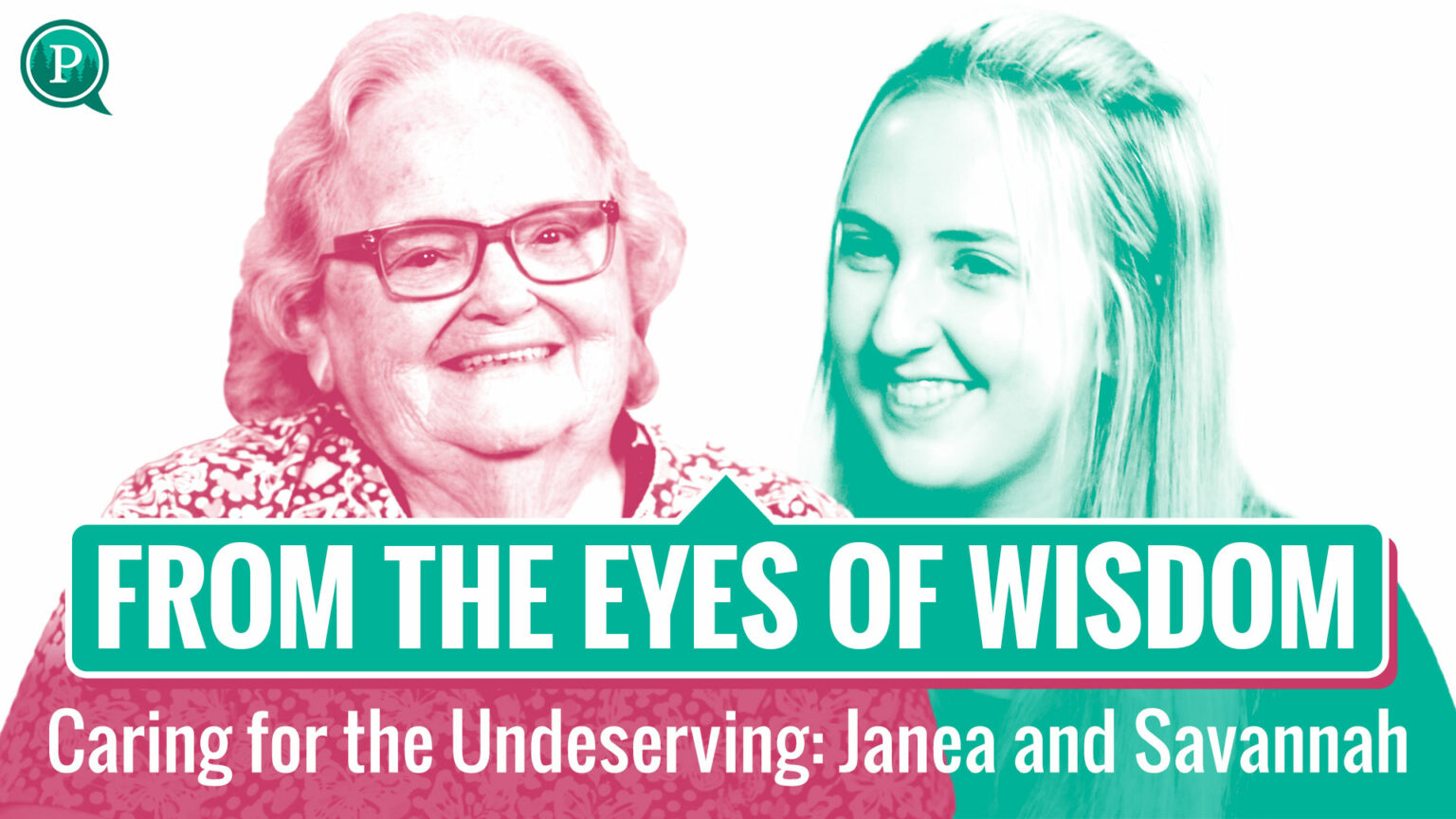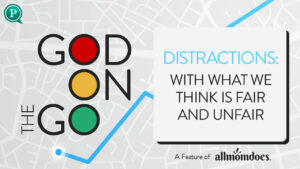With a heart for caring and full of compassion, Janea worked in prisons with people that you might put in the ‘undeserving’ bucket. She tells Savannah about these incredibly impactful experiences while sharing wisdom for Savannah’s life of loving others. What can we all learn about caring for those around us?
Find Out More:
CRISTA Senior Living | King’s Schools | CRISTA Media | CRISTA Ministries
Transcription:
Sherri Lynn:
Have you ever wished you could know what the future held before you got there? What if you were given the gift of knowledge before you even began your journey? Now I’ve been thinking about that because I made a lot of stupid mistakes when I was younger, and I wish I had someone to say, “Don’t go down that road. Go down this one.” I’m Sherri and welcome to From the Eyes of Wisdom where we are pairing an experienced elder from Krista Senior Living with a passionate King’s high school student ready to launch into the world. And while these conversations won’t tell the future exactly, they did reveal a lot we weren’t expecting about how to live life well. Are you ready? I can’t wait for you to hear this.
Welcome to From the Eyes of Wisdom. I am Sherri Lynn. It’s so wonderful to be here with you. And our guests are here. We have Janea.
Janea:
Yes.
Sherri Lynn:
Am I pronouncing it correctly?
Janea:
Absolutely.
Sherri Lynn:
All right. Janea is here and Savannah is here. Savannah is a senior in high school, right?
Savannah:
Yes.
Sherri Lynn:
Right? A senior at King’s and you want to go into nursing.
Savannah:
I do.
Sherri Lynn:
And Janea had a wonderful career in nursing.
Janea:
Yes.
Sherri Lynn:
All right. So we’re going to talk about that, talk about life and wisdom and things that you can learn and things that you’ve been through. I want to start with just, Savannah, I thought it was interesting why you want to get into nursing. Can you talk a little bit about that?
Savannah:
Yeah. Growing up, I’ve had a lot of health issues with my back, and so I’ve been in and out of the doctors’ offices, and it always stood out to me the nurses that were always there, even when the doctors weren’t, they just brought so much comfort. And in a time where it was scary and I didn’t really know what was happening, and still to this day have questions about it, they always would just me peace and comfort, and always made me feel so valued.
Sherri Lynn:
I will tell you that nursing to me is one of those … There are certain vocations that to me are God vocations, that are like angels. Teaching is one of them. Nursing would be one. I have family members who are nurses. You probably know this, you will learn this as a nurse. You become the medical person for your whole family. Everybody probably calls and is like, “My left ankle, something’s wrong, what am I going to do?” Because they think you know, right? And you just become that WebMD for your whole family.
The care that nurses have, it’s really hard to describe because they’re not the doctor. Like you said, that concern, that compassion, the knowledge that there’s just something specific about nursing that is angelic to me. It really is and I stand in awe for a person to say, “Yes, I will stand up and help this person who can’t do for themselves.”
Savannah:
Yes.
Sherri Lynn:
Isn’t that godlike?
Savannah:
It is.
Sherri Lynn:
That’s what God did for us through Jesus. I’m preaching now. Anybody got some water for me to … No. Okay.
Janea, tell me about specifically when we get to nursing, I’d like to know you were talking about working in isolation. That’s what you did in the beginning, right?
Janea:
Yes.
Sherri Lynn:
Talk about what that means when you were working in isolation in the hospital, because I don’t think that’s something … It doesn’t exist now, does it, or maybe it’s called something else?
Janea:
Well, they do have isolation wards and of course with COVID.
Sherri Lynn:
Oh, right, right. So what was it when you started working in it?
Janea:
Okay. When I started, it was in the ’50s and we were putting polio patients into iron lungs because that was the only way we could help with the respirations. We didn’t have what they have now, and I helped put polio patients and rest the iron lungs. I helped put tracheotomies in the patients right in their rooms and all. And we had a lot of antibiotics. I was in training only four years after the end of World War II so we had penicillin and it was just amazing. It was like miraculous cures, a lot of the things. And I trained in California and we put polio patients in the iron lung while they still had some of their lung muscles and they could breathe. We didn’t wait till they couldn’t breathe at all on their own, and the respiratory therapist told me that we actually saved muscles, so they were able to bring them out of the iron lungs much sooner.
Sherri Lynn:
When you first started, was it difficult seeing people so sick? Do you think about that, Savannah?
Savannah:
I do.
Sherri Lynn:
You’re seeing people at their absolute worst that they can’t … Do you consider that when you consider the field?
Savannah:
I think, just like for me, I carry a bunch of other people’s burdens I’ve noticed. So I think the biggest worry I have is just taking on seeing so much hurt and pain.
Sherri Lynn:
Did you have that in the beginning, seeing hurt and pain, feeling it, seeing these people in these terrible conditions, did you take that home with you in the beginning? Did it bother you?
Janea:
I think I was able to leave it there but also I was extremely caring because, number one, at the beginning I was living there at the hospital, so that was my home-
Sherri Lynn:
Wow.
Janea:
… for the first three years. And then of course when I had my own apartment, I think I was able to leave it there. But you did the best you could and especially if you could show them love. And then there were times when I worked with people who knew that they were dying and to be able to talk to them and help them. “If you’re having pain, let us know. We can give you more pain medicine.” And I was telling this one man how my mother saw the light at the end of the tunnel, and it was a beautiful, peaceful place, and she wanted to stay there so badly and she had to come back. I said, “Now my mother would not lie to me. So you have nothing to fear. You have this beautiful, peaceful place that you’re going to.”
Sherri Lynn:
So I hear you telling Savannah, “Listen, it’s going to be hard, but if you can love, if you can add value to the person.”
Janea:
Oh yes. And no matter, I mean I trained in a county hospital. We had the poorest people there, but you could still love them.
Sherri Lynn:
And you want to do missions, am I right?
Savannah:
I do, yes.
Sherri Lynn:
Talk a little bit about that.
Savannah:
Growing up, I’ve been involved in a lot of local missions as well as global. My dad worked at Seattle’s Union Gospel Mission, and so I kind of grew up with people who were experiencing homelessness and it just created something in me that just desired to help people. And just seeing how they really aren’t different than us. They have the same needs. They have families and they just need love. So that started it. And then going on some mission trips recently too, Mexico and most recently Nicaragua last year, just showed me how big our world is and how much of Jesus the world needs. And just the possibilities of being able to help people all over the world, I don’t know, that just sounds really cool to me.
Sherri Lynn:
Yeah. And adding Janea’s wisdom to it of saying the way you can help them even when it’s hurting, and I would guess seeing people in pain has to hurt you a little.
Janea:
Yes. But we have things that can help them with their pain.
Sherri Lynn:
And you’re like, “I know I can help here.”
Janea:
Yeah, and sometimes just talking to them and finding out what’s bothering them the most and all, aside from their pain and what they’re going through. I’ve had that several instances of that, and I just told the patients what I believe. I said, “No, that’s not going to happen, and don’t you worry about it.”
Sherri Lynn:
So a step beyond just being the nurse that gives the medicine or gives the medical care, but being a listening ear or being someone they can trust or being someone that cares about the person in front of them.
Janea:
That’s right.
Sherri Lynn:
That that matters.
Janea:
Yes, that’s important.
Sherri Lynn:
Did you ever walk out of a room and say, “You know what, I’m pretty good at nursing. Doggone it, I’m good at this?” Did you ever have a day like that?
Janea:
Yeah. I felt that.
Sherri Lynn:
You did?
Janea:
Yeah.
Sherri Lynn:
Okay. Was there anything specific you remember when you were like, “You know what, I’m good at nursing?”
Janea:
The first day I was in uniform, I was just out of high school, 18 years old.
Sherri Lynn:
Oh, really?
Janea:
Oh yeah. I had my uniform on and all we could do was pass water or bed pens. That’s it.
Sherri Lynn:
You don’t want to mix them up.
Janea:
I felt like I had come home. This is where I belong.
Sherri Lynn:
Really?
Janea:
And I’ve never changed.
Sherri Lynn:
Sense of purpose. That’s nice.
Janea:
Absolutely.
Sherri Lynn:
Yeah, okay.
Janea:
When I couldn’t do much of anything, this was it.
Sherri Lynn:
Oh my goodness. I love that. I pray that for you, Savannah. Do you already feel that towards nursing? Like, “This is my purpose?”
Savannah:
I don’t think I’ve hit that quite yet. I feel like I am really called to it, and I think it will open up really cool doors, but I think there will be a moment when I definitely feel like that.
Janea:
Well, it’s a blessing and I pray that you get it.
Sherri Lynn:
Yeah. I can imagine that feeling of saying-
Janea:
Well, and so many young people in the ’50s, “I have to find myself.” And I thought, “Oh, those poor people, I never had a problem.”
Sherri Lynn:
Yeah, I got mine. I got this uniform. Let’s go. Listening to your story, Janea, I thought about dealing with people because, Savannah, well, in high school … Let me ask you this. How do you deal with a difficult person in high school?
Savannah:
I think it’s hard. I think going through it is definitely difficult, but just stepping back and realizing we all have our things, we all have our struggles, and we just all have different ones, and we need to be supported and loved in different ways.
Sherri Lynn:
Have you dealt with someone difficult this school year where you were like he or she is getting on my last nerve? How did you get out of it? Were you mad? Did you go off? Did you go home? Did you cry? Did you call somebody? What did you do? How did you deal with it?
Savannah:
I don’t know. It hasn’t been that bad but in moments where I found myself getting frustrated, just giving some space and really just encouraging myself to give grace.
Sherri Lynn:
Yeah, give grace.
Savannah:
Yeah. It’s not going to be a forever thing. We’ll work past it and it’ll be good.
Sherri Lynn:
All right, because I feel people who I know who are nurses, people who I love who are nurses, it’s the personalities that they have talked about that you can come across. And the people I’ve talked to, but you tell me, it’s not even the patients. It’s the other nurses, it’s the doctors, it’s the clashing of the personalities that can cause you some friction and some issues. I’m wondering what wisdom you would give to her. Because right now she’s like, “Yay, nursing. Woo, help people. Yay, missions.” And then she’s going to be with some other nurses and that yay is going to come down about five decibels. And I’m wondering what wisdom you would give on dealing with difficult people, how you work through that.
Janea:
I’m trying to think because I think the most difficult people I worked with are those that were in jail or prison because I did work both places, but I found out … I always showed them respect.
Sherri Lynn:
Well, I’m going to say something about that real quick because I was listening to your pre-interview and you said something that struck me and I wrote it down. The interviewer asked you how did you help people who you knew did these heinous horrible things. She’s the nurse in jail, and so you’re bringing this person, I know what you’ve done to other people, that’s why you’re in this jail. And you said, “I treated the illness.”
Janea:
The illness.
Sherri Lynn:
The illness. I treated the illness.
Janea:
The one person I was thinking of, he had an infection in his hand, and what he did is I won’t even tell anybody it was so horrendous. But to me that was the infection and that’s what I had to treat. And I tried to be very polite to him.
Sherri Lynn:
Because the illness … See, again, that is very spiritual to me and very Christlike to me is what he does for us. He does to the sin … Whatever, I am treating the illness. That’s why I think nursing is so amazing is that you could do that and that takes a specific person. God bless both of you. Because I’d be like, “He did what? No. Well, then, his hand is going to have to shrivel up then.” That’s how I would be.
Janea:
Well, I’ve always felt nurses, anybody going into nursing, has to be someone who wants to help. And even now, at 90, I’m always trying to help people and sometimes the only way I can help them is by smiling at them. And some people where I live here, they’ll be kind of having a grouchy day or something, but I’ll smile and I’ll say, “Oh, I really like your top today.” I feel that’s the only way I can help them now.
Sherri Lynn:
So if she’s going to come up against somebody she’s working with, because I think you talked about there was a doctor you just didn’t like and you were working for him and it was like, “This guy-
Janea:
Oh yeah.
Sherri Lynn:
… “Lord, this guy, father God, this guy.” So she’s going to have that, right? She doesn’t know it yet, but she’s going to have it. What suggestion would you give her? What wisdom would you give her in dealing with people like that?
Janea:
What I did is I isolated myself in this little room and cried and said, “God, keep giving it to me. I don’t want this kind of a husband,” because I was told if you don’t learn to work this out with him, you’re going to get the same kind of person as a husband.
Sherri Lynn:
Who told you that?
Janea:
A spiritual teacher. And so I go in the lab and cry and say, “Okay, God, keep giving it to me. I am going to get through this no matter what.” And I did.
Sherri Lynn:
Yeah,
Janea:
I could go out and be very nice and pleasant. And I thought of all his good points. He did have a lot of good points.
Sherri Lynn:
There you go. Well, that sounds like something that you’re already considering where you said, “I kind of take a step back and want to give grace and think about it.” Because that happens no matter what the job is, we’re going to come up against people where you’re like, “This is a lot and this person is a lot and I’ve had a lot and I don’t want anymore.” And being able to go beyond that, but isolating yourself and getting that emotion out by yourself I guess helped.
Janea:
Yes. That’s what really helped me.
Sherri Lynn:
Yeah. So leaving a job or leaving a situation, you said something that was really good and I thought, man, I never thought about that before because now … This is not to disparage your generation, Savannah, of course. But there was something called quiet quitting, and then people just kind of leave. I’ve seen people on the TikTok, that’s what it’s called, the TikTok, I’ve seen people on the TikTok would just leave online. They quit online for everybody to watch. One guy, you shouldn’t do this, but it was kind of funny, he left with a marching band. The marching band came in for him to say, “I quit.” He had a whole big bass drum and snare and whatever.
Okay. So there’s this thing where it’s burning bridges and you said something about leaving a situation and I guess not even just a job, just a situation. The phrase was, “I really learned a lot.”
Janea:
Okay. I’ve always told the younger nurses that when you go to quit a job, if you cannot stand that job and that’s it, you’ve got to quit, you don’t burn bridges. What you do is you write and say, “I really learned a lot.” Maybe all you learned was that you hated that place.
Sherri Lynn:
That’s a lot.
Janea:
But you just say, “I learned a lot but it’s time for me to move on. Thank you.” And that’s it. Twice I have worked. I worked for Sisters of Providence and 20 years later I went back and worked for them again in the jail, and then I went to the prison, then I went back to the jail. They rehired me. They rehired me each time because I was pleasant.
Sherri Lynn:
I really learned a lot. Savannah, that is really good. I really learned a lot. It’s time for me to move on but I really learned a lot. Do you have any questions, maybe specific ones, nursing, that I wouldn’t have to know or ask?
Savannah:
I would love to hear some of the stories about you and the prisons and what kind of experiences you had there.
Janea:
I could be so stupid sometimes. I thought I was applying for a visiting health nurse job in Reno. I thought it was kind of funny. I had to go to the jail to apply, to visit it. I had no clue it was a jail nurse. But I’ve always had the feeling that when you apply for a job, you go for it. And if God wants you to have it, you’ll get that job. If he doesn’t want you there, you won’t get it. So it was comforting to me because most of the times I got the job, so I thought, “Well, I’ve got to go for the job.” So I went for it and I got it. But that’s how I ended up a jail nurse.
Sherri Lynn:
You realized you weren’t visiting.
Janea:
I thought I was visiting [inaudible 00:18:42].
Sherri Lynn:
So pay attention to the application.
Janea:
Yeah. Make sure you know what you’re going for.
Sherri Lynn:
There’s a lesson. What else? Any other questions?
Savannah:
Do you have one patient you remember, someone that really stuck out to you for one reason or another?
Janea:
Yes. When I worked in the jail, there was a man, I don’t even know what he was in for, but he was a Black Muslim and he wanted to have nothing but peanut butter and jelly sandwiches for lunch because they always served sandwiches every lunch and sometimes it was tuna fish. And according to his religion, he could not eat tuna fish.
So I said, “Fine.” I said, “Make out a thing to see the doctor. And if the doctor orders you to have peanut butter and jelly, you’ll have peanut butter and jelly the whole time. You’ll save the county a lot of money too.” So anyway, that’s what happened. He did that. Well, then, on doing medicine rounds one time, I heard him talking to some young kid who didn’t know his way around. Anyway, he told him, he said, “You be nice to that nurse. If you need something like to go to a dentist or to see a doctor or something, she’ll make sure you get there. But if you’re going to treat her badly, forget it. So you be nice to her.”
Well, I met him in prison, my Black Muslim friend, and so the last time I saw him I said, “I want you to know I heard you talking to that young prisoner and I so appreciate what you said to him.” So I almost felt like we were friends, even though I didn’t know that much about him.
Sherri Lynn:
Well, you must have showed him a level of love and compassion that he probably wasn’t used to being a prisoner, right? And so much so that he was willing to tell other prisoners, “Hey, respect her.”
Janea:
Yes.
Sherri Lynn:
That’s really what you want.
Janea:
And that meant a lot to me and I let him know that.
Sherri Lynn:
I understand why.
Janea:
But that’s what I believe in doing is you thank people. I said to somebody who loaned me her phone. I said, “Did I thank you for that yesterday?” She says, “You thank me all the time,” but I was so worried that I’d forgotten because I really believe you thank people for what they do, even for a smile or a good word. And I did that with patients.
Sherri Lynn:
That’s amazing.
Janea:
And one of the ladies wrote a letter to me thanking me. She said, “It was so nice whenever you walked into our ward at night, there was always a smile on your face,” and that meant a lot to her.
Sherri Lynn:
Yeah, I bet it did. It goes back to what we were saying which is it goes so much more than just medical care.
Janea:
Yes.
Sherri Lynn:
It’s making that person feel like, well, for our faith-
Janea:
They’re worthy.
Sherri Lynn:
That they’re worthy, that God loves them, and I am a representative of him-
Janea:
That’s true.
Sherri Lynn:
… coming here now to help you. And that’s again why I honor the profession the way I do. Any other questions you may have?
Savannah:
One last question. Did you have anyone that you looked up to or someone that inspired you to get into nursing?
Janea:
When I was five years old, I was going to be a nurse and take care of babies, my girlfriend and I. And that never changed. As a teenager and all, it was never any question in my mind. And at Highland, the county hospital, it cost $50 a year. You got all your uniforms, books, you lived there, you got your room and board and everything, $50 a year.
Sherri Lynn:
That’s what your tuition’s looking like right now?
Janea:
But you see-
Sherri Lynn:
Yeah. Why not?
Janea:
God just-
Sherri Lynn:
That’s wonderful.
Janea:
And it was fantastic because at county hospital, you only had people if they were sick. A student nurse from another hospital that was taking pediatrics or something at our hospital, I heard her say, “I’m so tired of sick people.” And I said, “What do you mean you’re tired of sick people?” “Oh, well, at our hospital if the doctor goes on a convention, his wife comes into the hospital for the week he’s gone and took up a private room.”
Sherri Lynn:
Oh wow.
Janea:
That’s what went on at one time. But now they can’t do that because of insurance.
Sherri Lynn:
You were there when it was people were actually sick and you had to take care of them.
Janea:
Yes, that’s right. You didn’t get in the hospital unless they were sick and very, very sick.
Sherri Lynn:
You have wonderful questions, Savannah. Now I am going to tell you to take that piece of paper over on your side and that pen. And, Janea, I’m going to say that if she needs one piece of advice, she’s going to write it down from you and she’s going to carry that to college that’s probably more than $50 a semester and she’s going to carry that to her first nursing job. Just one piece of advice from your years of wisdom and living and all the twists and turns your life has taken and how God has kept you through it all, what one piece of advice would you want her to have that she will keep that piece of paper for the rest of her life?
Janea:
No problem. Live without regrets. I stood by while a doctor was examining this patient and she was crying and he said, “What’s the matter?” “I want to see my mother. Oh, if I could only see my mother one more time.” And he said, “Well, then why don’t you go and see her?” “She died.” And this woman did end up on a psychiatric ward and I made up my mind then and there I was not going to live with regrets. The last two years Mom was alive, I would go over and see her and sometimes I didn’t want to and this and that, but I did it anyway and I’m so grateful I had those last two years and so many times maybe I didn’t want to do something, but I made myself do it.
Sherri Lynn:
So you wouldn’t regret it later.
Janea:
I was never sorry. I really have no regrets at all. And boy, that is like peace and God’s love and everything. It’s a blessing from God. And, in fact, we had to write something out for seniors, our advice, live without regrets.
Sherri Lynn:
Live without regrets. In fact, Savannah, can I borrow that pen? I’m going to write that down for myself. Live without regrets.
Janea:
Oh, it’s a blessing.
Sherri Lynn:
It is.
Janea:
Especially when you get older and you have nothing to do but think about your past, which I’ve really been thinking about lately. And I thought, “Oh, I’m so grateful.”
Sherri Lynn:
That you can live without regrets.
Janea:
What a blessing my life has been. I might not have a lot of money or anything else but, boy, I’ve had so many blessings it’s worth it.
Sherri Lynn:
God is good. Thank you, ladies, so much. You have been absolutely wonderful. Savannah, Janea, thank you [inaudible 00:25:51]. I’m Sherri Lynn and this is From The Eyes of Wisdom, and we’ll see you next time.







